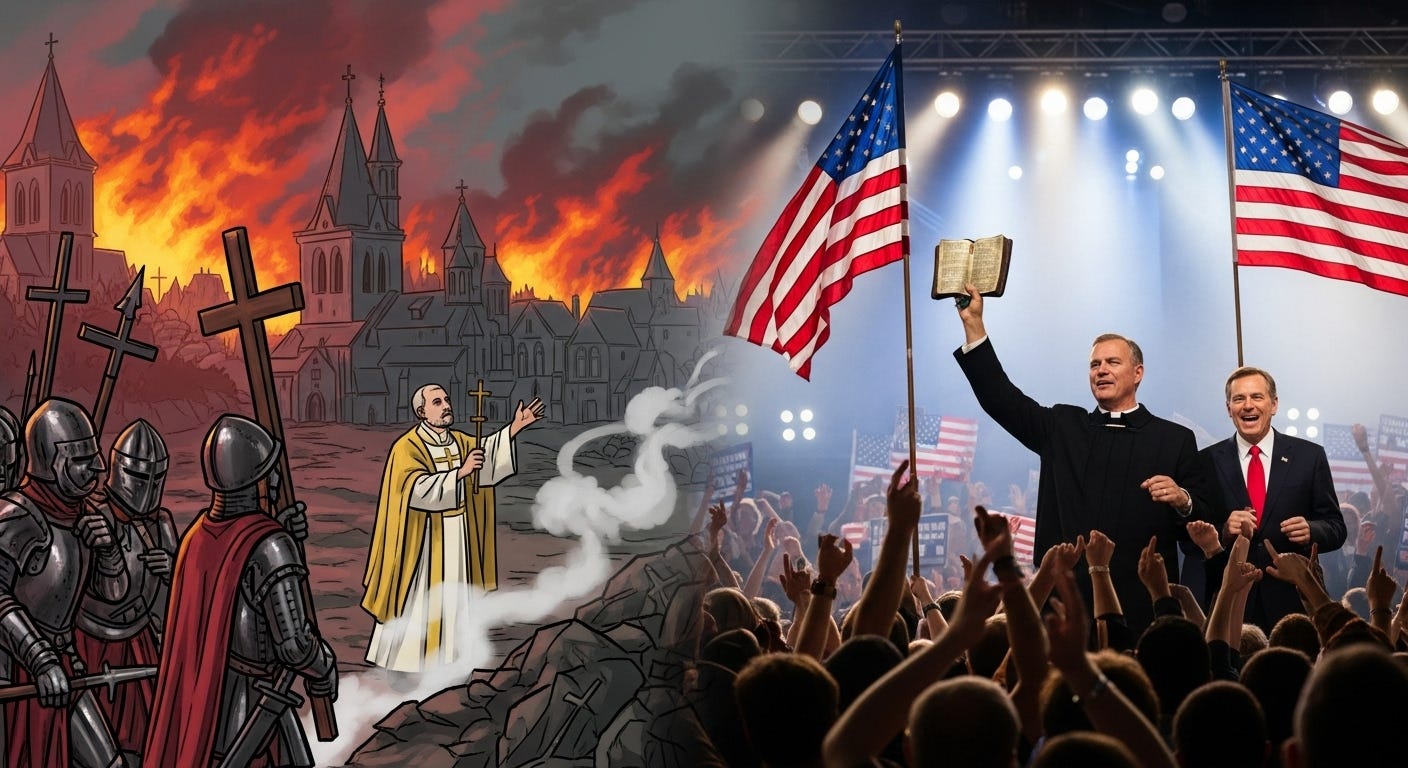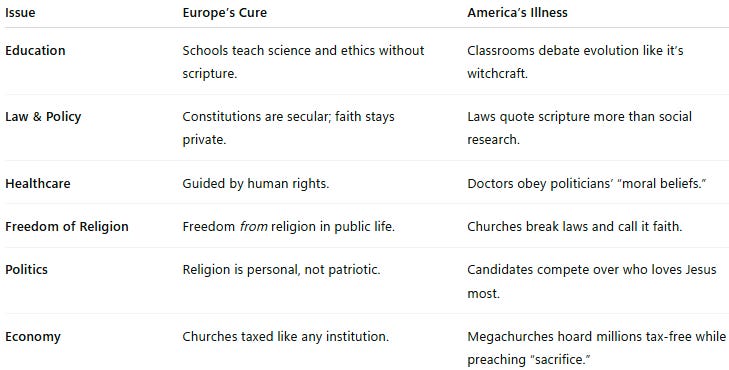The Lesson America Refuses to Learn from Europe’s Secular Revolution
Europe cured its holy fever. America still thinks it’s the cure.
Europe burned itself to the ground before figuring out that mixing religion with government is like pouring gasoline on a church candle. America, on the other hand, is acting like it’s never read the ending. Every election, the same song: pastors barking orders from pulpits, politicians waving Bibles they barely opened, and voters thinking God has a favorite party. Europe already tried that—five hundred years ago—and the continent nearly tore itself apart. America saw the smoke and asked for the recipe.
Europe’s Bloody Detox
Before Europe found reason, it found slaughter. The Protestant Reformation in the 1500s tore Christendom in half. What began as Martin Luther complaining about church corruption turned into a century-long bloodbath. Every kingdom picked a side, and both claimed God’s blessing.
The Thirty Years’ War (1618–1648) was the worst of them all—a continental apocalypse disguised as theology. Armies marched under crosses, priests blessed massacres, and one in every five Germans died. Whole towns vanished from maps. The war started over religion and ended because there was nobody left to kill.
In France, Catholic mobs slaughtered thousands of Protestants on St. Bartholomew’s Day in 1572. The rivers of Paris ran red while priests rang church bells in celebration. The king thanked God for victory over “heretics.”
In England, religion justified decapitations. First the Catholics burned Protestants, then the Protestants hanged Catholics, and when that got boring, they fought each other over which version of the Bible was more “pure.” The English Civil War became a holy war in everything but name.
After all that, Europe was broken. Faith didn’t look like salvation anymore—it looked like chaos. People didn’t stop believing in God; they stopped believing in priests with armies.
The Birth of Secular Europe
Out of the wreckage came a new idea: maybe religion shouldn’t run the state. The Peace of Westphalia in 1648 was more than a treaty—it was Europe’s first step toward sanity. It declared that rulers could no longer invade neighbors in God’s name. That single agreement planted the seed of secular government.
Then came the Enlightenment. Thinkers like Spinoza, Locke, and Voltaire watched the ruins and said what everyone knew but feared to say: belief should be personal, not political. Voltaire summed it up perfectly—“Those who can make you believe absurdities can make you commit atrocities.”
From then on, Europe began to separate truth from tradition. Science rose, literacy spread, and slowly the church’s grip on power slipped. By the 18th century, kings no longer ruled “by divine right,” and priests stopped dictating law. Reason became the new religion—and for once, it didn’t demand blood.
America’s Late Homework
Fast-forward to the United States, land of freedom and holy confusion. The Founding Fathers knew Europe’s history. That’s why they wrote, “Congress shall make no law respecting an establishment of religion.” They wanted faith protected but powerless—something personal, not political.
But they were short-sighted. Secularism doesn’t come from writing one amendment; it comes when religion is pushed out of politics altogether. A line in the Constitution means nothing if preachers can still rally votes and presidents can still quote scripture as policy. Real secularism begins when religion stops being campaign fuel—when no one feels the need to legislate belief or ban abortion “because, by the way, it’s against our faith.”
Naturally, it didn’t stick. America’s frontier preachers and revivalists turned religion into show business. Tent revivals became stadium rallies; pastors became celebrities.
Then came the 1950s. The Cold War turned religion into a weapon. Washington wanted to prove America was morally superior to “godless communism,” so politicians stuffed God into everything. “In God We Trust” was printed on money. “Under God” was shoved into the Pledge of Allegiance.
By the 1980s, the Moral Majority arrived—Jerry Falwell, Pat Robertson, and a lineup of televangelists who turned churches into political factories. They told Christians that God wanted low taxes, conservative judges, and foreign wars. Reagan rode their faith straight to the White House.
Since then, religion and politics have been Siamese twins. Every few years, another preacher-turned-politician shows up to promise salvation at the ballot box.
How Churches Became Corporations
Europe taxed religion. America sold it. Megachurches became spiritual shopping malls—coffee bars, live bands, credit card tithes. Pastors wore Rolexes while quoting Jesus about humility.
Televangelism transformed faith into entertainment and money into morality. Every prayer came with a price tag. Every cause became a “holy war.” Europe had its crusades. America has Fox News and prosperity gospels.
Today, religion is no longer about God—it’s about power. Politicians use it to stir fear; churches use it to keep control.
The Real Cost of Holy Politics
When religion runs government, truth dies first. In medieval Europe, priests banned books and burned thinkers. In modern America, school boards ban science and censor libraries. It’s the same disease—just digital now.
Europe had inquisitions. America has “parents’ rights groups.” Same mindset: fear knowledge, control minds, save souls that never asked for saving.
When politicians treat the Bible as policy, the results are predictable: women lose rights, minorities lose safety, and progress becomes “sin.” Europe lived that nightmare already. It took the Enlightenment to end it. America keeps replaying the prequel.
Europe vs. America: Same Religion, Different Lessons
Europe’s Cure: Separation and Shame
Europe’s cure wasn’t just separating church and state—it was being ashamed of what happened when they didn’t. The memory of crusades, massacres, and inquisitions burned deep. No one wanted that back.
So Europe built walls between faith and government. But it didn’t happen the same way everywhere.
France passed its 1905 Law on the Separation of Churches and State, enforcing laïcité — faith became private, schools secular, and politics allergic to preaching.
Germany kept religion but put it on a leash through its church tax system — transparent, voluntary, and separate from lawmaking.
Scandinavia disarmed religion gently: the Church of Sweden was disestablished in 2000, turning faith into culture instead of authority.
Southern Europe grew up late but strong. Spain and Italy broke from the Vatican’s grip after dictatorships, proving that freedom doesn’t need permission from the clergy.
Religion survived — but it lost its teeth.
Religion Defanged
Faith in Europe became cultural, not compulsory. Priests don’t run governments. Schools teach evolution, not Genesis. Laws are based on rights, not revelation.
Europe learned that secularism doesn’t destroy faith—it saves it from politics. It keeps belief human, humble, and voluntary.
America, meanwhile, still thinks power and piety are twins. Europeans know they’re distant cousins who should never share a house again.




